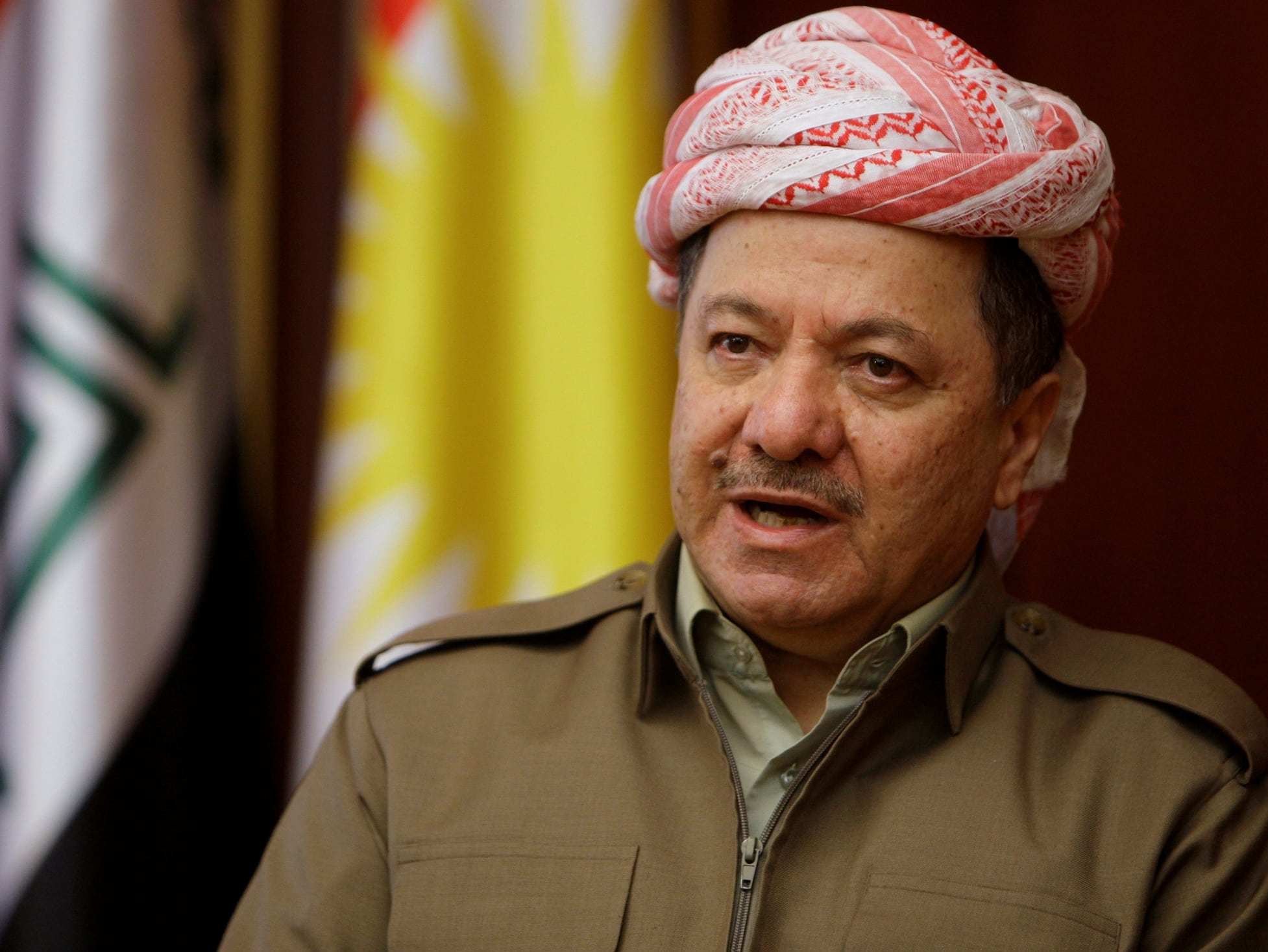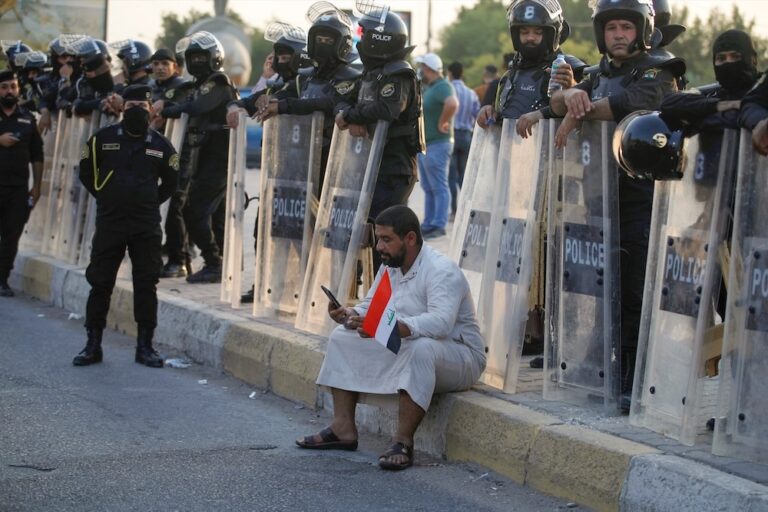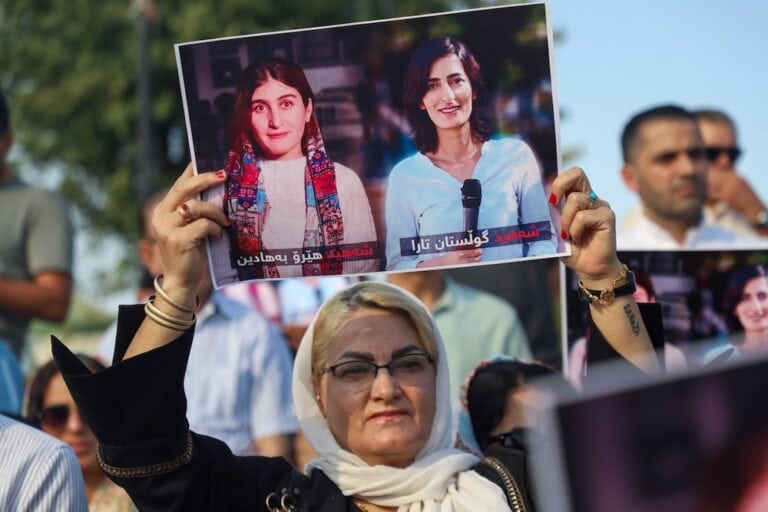During 2012, the Kurdistan Regional Government security forces are reported to have arrested and detained at least 50 journalists, critics, and opposition political activists arbitrarily, and prosecuted at least seven of them on criminal charges concerning insulting or defaming public figures.
(Human Rights Watch/IFEX) – 10 February 2013 – Iraq’s semi-autonomous Kurdistan Regional Government (KRG) should stop arbitrarily detaining journalists, activists, and political opposition figures, and end its prosecution of journalists for insulting or defaming public figures. The Asayish – the Kurdistan Security Agency – and police arrested without warrants journalists and others who published articles criticizing public officials, and detained them without charge or trial for periods ranging from several weeks to a year.
In what appears to be a blatant violation of the rule of law, officials in the Ministry of Justice and Ministry of Endowments and Religious Affairs have sought to enforce a proposed law criminalizing “insult” against religious and political leaders, even though the legal and human rights committees of the Kurdish parliament have so far blocked the law’s enactment. If passed, the law would be a serious violation of basic free speech standards in the Kurdistan Region, Human Rights Watch said, and could prevent investigative journalism and disclosures about high level corruption in the oil rich region.
“These are dark days for freedom of expression in Iraq’s Kurdistan region,” said Sarah Leah Whitson, Middle East director at Human Rights Watch.“Instead of ensuring the justice system investigates high-level corruption, the Kurdistan Regional Government is ignoring its own laws to protect free speech and assembly, and using “laws” that are not in force to silence dissent.”
During 2012, KRG security forces are reported to have arrested and detained at least 50 journalists, critics, and opposition political activists arbitrarily, and prosecuted at least seven of them on criminal charges concerning insulting or defaming public figures, according to information obtained by Human Rights Watch during six visits to the Kurdistan Region, the most recent in November and December. One former customs official, Akram Abdulkarim, has been in jail for more than a year without trial on national security charges after he accused leading members of the Kurdistan Democratic Party, one of the two parties in the coalition that rules the Kurdistan Region, of siphoning off customs revenues.
In November and December, Human Rights Watch interviewed 16 journalists, political activists, and others arrested since the beginning of 2012, after criticizing regional government authorities. The authorities released some without charge after a period in detention but successfully prosecuted others on defamation or insult charges, resulting in fines and prison sentences. One, lawyer Zana Fatah, said police detained him without charge for six days at a prison in Chamchamel in October, after he wrote an article accusing the judiciary of lacking independence from the main political parties. The police accused him of defaming the judges but did not charge him with any offense.
Human Rights Watch expressed its concern about the crackdown on free speech in meetings in November with officials of the regional government’s Department of Foreign Relations and the Asayish. In response, one official said that, “Talk of corruption cannot be tolerated.” Officials said that detained journalists were liars and were “violating the human rights of the government,” in one official’s words.
Article 2 of the Kurdistan Press Law (Law number 35 of 2007) protects journalists’ right to “obtain information of importance to citizens and relevant to the public interest from diverse sources.” The law also says that journalists are protected against arrest for publishing such information, and requires the regional government to investigate and punish “anyone who insults or injures a journalist as a result of his work.” The law says that a journalist may not be charged with defamation if “he has published or written about the work of an official or a person entrusted with a public service…if what he has published does not go beyond the affairs of the profession,” although the law does not define these terms.
The regional government should respect the Press Law and end the harassment of journalists and other critics, Human Rights Watch said. Parliament should enact a freedom of information law that guarantees the public’s right to know, and appropriate access by journalists to information held by government and public institutions.
“Rather than subjecting journalists and other critics to arrest and other punitive measures for expressing dissent or exposing alleged corruption, the KRG authorities should be upholding free speech,” Whitson said. “The authorities need to investigate and punish cases of abuse of this right, as their own Press Law requires, and hold those responsible for abuse to account.”
Arrests, detentions, and other abuses of the rights of journalists and government critics in the Kurdistan Region have taken place in a climate of impunity, with no prosecutions of members of the Asayish or other security forces for exceeding their powers or breaching detainees’ rights.
Niyaz Abdullah of the Metro Center for Defending Journalists, a local media freedom group, told Human Rights Watch that the center had documented over 100 complaints about breaches of journalists’ rights that authorities have not investigated. “The government is ignoring the laws in place that require it to investigate abuses and harassment of journalists, and to hold the wrongdoers accountable,” Abdullah said.
In its year-end report, the Metro Center documented 21 cases of alleged physical assaults of journalists, including 1 armed assault, 50 arrests, 34 instances of security forces confiscating journalists’ equipment, and 5 death threats against journalists. When Human Rights Watch questioned the regional government’s failure to investigate complaints of abuses in detention, a senior Asayish official first denied that any complaints had been made against the Asayish and then, when confronted with evidence to the contrary, said that those who made the complaints were liars.
In March, Human Rights Watch documented police beatings and detention of journalists as they covered demonstrations marking the anniversary of protests that began on February 17, 2011 and then spread throughout the Kurdistan Region. In the year following the start of those protests, security forces killed at least 10 protesters and bystanders, and injured more than 250 others.
“Sadly, the Kurdistan Regional Government today looks less and less like the open and thriving democracy it paints itself to be,” Whitson said. “By undermining legal guarantees for free speech, the KRG is undermining one of the basic pillars of a free society.”
For details about the crackdown on journalists, critics and protesters, and of individual cases click here.



